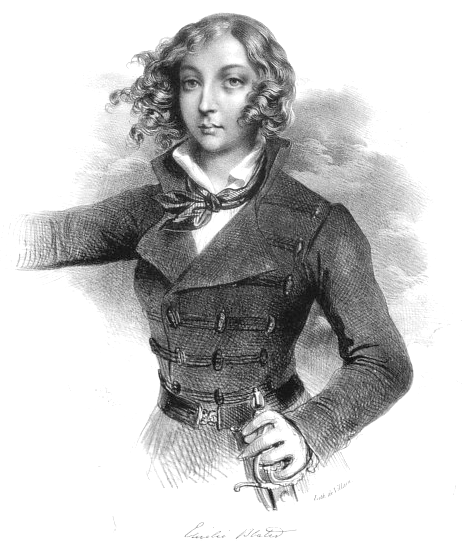Emilia Plater Independent Women's Battalion on:
[Wikipedia]
[Google]
[Amazon]
The Emilia Plater Independent Women's Battalion ( Polish: Samodzielny Batalion Kobiecy im. Emilii Plater) was a unit of the
 The unit was formed on 15 July 1943 as an all-female unit of the Soviet Polish Army. Its personnel were drawn from women deported from Soviet-occupied Poland and communist volunteers. There was no shortage of volunteers from among the internees, many of whom were eager to escape the poor conditions of their imprisonment. This was the first all-female Polish unit and had originally been opposed by the Soviet authorities who only relented when General Anders pointed out the widespread use of women in the Soviet Army. The battalion was named after
The unit was formed on 15 July 1943 as an all-female unit of the Soviet Polish Army. Its personnel were drawn from women deported from Soviet-occupied Poland and communist volunteers. There was no shortage of volunteers from among the internees, many of whom were eager to escape the poor conditions of their imprisonment. This was the first all-female Polish unit and had originally been opposed by the Soviet authorities who only relented when General Anders pointed out the widespread use of women in the Soviet Army. The battalion was named after
Soviet
The Soviet Union,. officially the Union of Soviet Socialist Republics. (USSR),. was a List of former transcontinental countries#Since 1700, transcontinental country that spanned much of Eurasia from 1922 to 1991. A flagship communist state, ...
First Polish Army during the Second World War
World War II or the Second World War, often abbreviated as WWII or WW2, was a world war that lasted from 1939 to 1945. It involved the vast majority of the world's countries—including all of the great powers—forming two opposi ...
. It was created in 1943 with the intention of serving as a front-line fighting unit, but it was mostly used for police and sentry work. It existed until May 1945, when the war came to an close, at which point it had 500 members.
Formation
Emilia Plater
Countess Emilia Broel-Plater ( lt, Emilija Pliaterytė; 13 November 1806 – 23 December 1831) was a Polish–Lithuanian noblewoman and revolutionary from the lands of the partitioned Polish–Lithuanian Commonwealth. Raised in a patriotic tra ...
, a female Polish-Lithuanian leader who had fought against the Russians in the 1830 November Uprising
The November Uprising (1830–31), also known as the Polish–Russian War 1830–31 or the Cadet Revolution,
was an armed rebellion in the heartland of partitioned Poland against the Russian Empire. The uprising began on 29 November 1830 in W ...
. The individual soldiers were nicknamed the Platerówski. The commanders of the unit were men but its political officers were women.
History
The unit numbered 690 women when it was formed. It originally formed part of the Polish 1st Tadeusz Kościuszko Infantry Division but from 19 August 1943 was transferred to the I Polish Corps (this formation became the First Polish Army on 17 July 1944). It was intended to be used as a front-line combat unit but issues with training and possibly a reluctance by its commanders to risk large-scale female combat losses meant that it was relegated largely to sentry and military police duty. It also carried out medical and communications duties and provided training to women working elsewhere in the Polish Army. Some women officers of the battalion commanded all-male combat platoons within other formations. At the war's end in May 1945 the battalion comprised around 500 women, with 70 having been killed in service. The only woman ever decorated with the Gold Star of theHero of the Soviet Union
The title Hero of the Soviet Union (russian: Герой Советского Союза, translit=Geroy Sovietskogo Soyuza) was the highest distinction in the Soviet Union, awarded together with the Order of Lenin personally or collectively for ...
who was not a Soviet citizen is Aniela Krzywoń, a member of this unit, after she died of injuries sustained while rescuing important military documents from a burning truck after a Luftwaffe
The ''Luftwaffe'' () was the aerial-warfare branch of the German '' Wehrmacht'' before and during World War II. Germany's military air arms during World War I, the '' Luftstreitkräfte'' of the Imperial Army and the '' Marine-Fliegerabt ...
bombing raid.
Women veterans of the unit successfully sued Polish journalist and author Henryk Piecuch for slander in the 1990s after he claimed the battalion was organised solely to provide sexual services to male officers.
Organisation
Upon its formation the battalion comprised: *Command unit *Five companies **1st Infantry **2nd Infantry **Fusilier **Machine gun **Anti-tank *Six platoons **Mortar **Reconnaissance **Signals **Medical **Engineer **Logistics **Transport (added late in 1943)References
{{Authority control Military history of Poland during World War II Military units and formations established in 1943 Military units and formations of Poland in World War II Military units and formations disestablished in 1945 Poland–Soviet Union relations All-female military units and formations